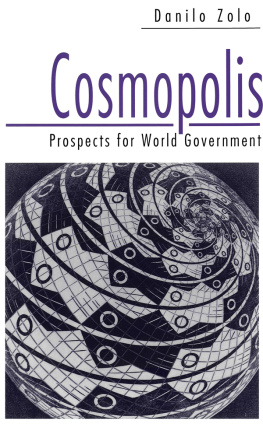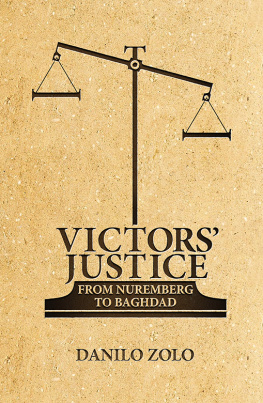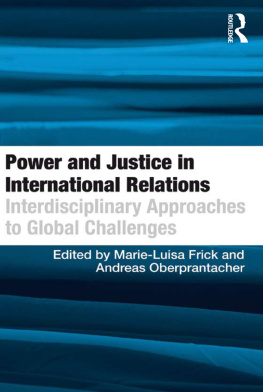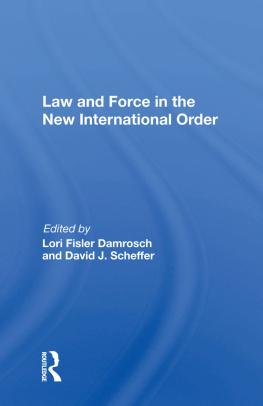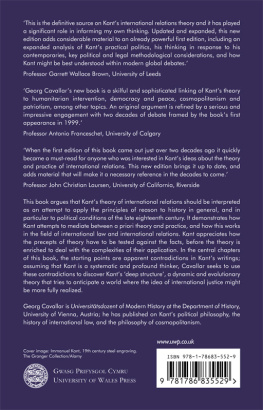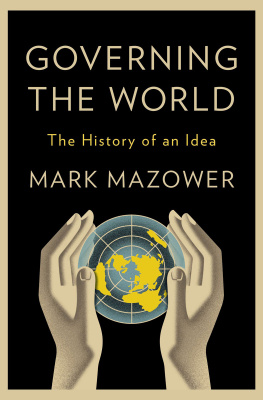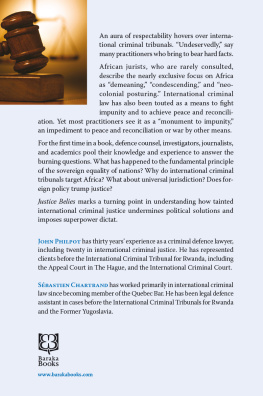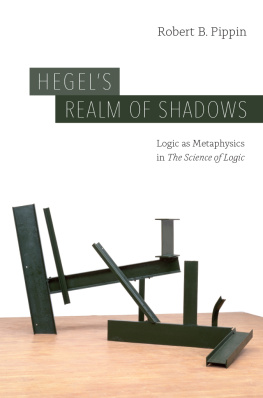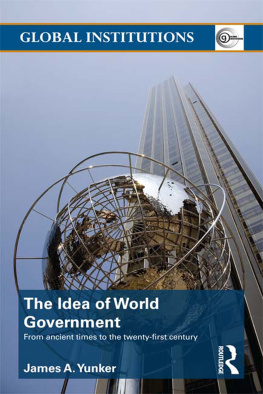COSMOPOLIS
Prospects for World Government
DANILO ZOLO
Translated from the Italian by David McKie
Polity Press
Copyright Danilo Zolo 1997
The right of Danilo Zolo to be identified as author of this work has been asserted in accordance with the Copyright, Designs and Patents Act 1988.
First published in 1997 by Polity Press in association with Blackwell Publishers Ltd.
2 4 6 8 10 9 7 5 3 1
Editorial office:
Polity Press
65 Bridge Street
Cambridge CB2 1UR, UK
Marketing and production:
Blackwell Publishers Ltd
108 Cowley Road
Oxford OX4 1JF, UK
Published in the USA by
Blackwell Publishers Inc.
237 Main Street
Cambridge, MA 02142, USA
All rights reserved. Except for the quotation of short passages for the purposes of criticism and review, no part of this publication may be reproduced, stored in a retrieval system, or transmitted, in any form or by any means, electronic, mechanical, photocopying, recording or otherwise, without the prior permission of the publisher.
Except in the United States of America, this book is sold subject to the condition that it shall not, by way of trade or otherwise, be lent, re-sold, hired out, or otherwise circulated without the publishers prior consent in any form of binding or cover other than that in which it is published and without a similar condition including this condition being imposed on the subsequent purchaser.
ISBN 0745613004
ISBN 0745613012 (pbk)
ISBN 978-0-7456-6933-5 (ebook)
A CIP catalogue record for this book is available from the British Library and the Library of Congress.
Typeset in 10 on 12 pt Times
by CentraCet Ltd, Cambridge
Printed and bound in Great Britain by
Marston Lindsay Ross International Ltd,
Oxfordshire
Contents
The Newtonian image of the state as a planetary system and the power of the sovereign as a counterpart of the central force of the sun, fleshed out and added details to Hobbes basic picture. The stability of society required not just centralized force, but also a system of fixed orbits: a modern Cosmopolis.
In both science and philosophy the intellectual agenda today obliges us to pay less attention to stability and system, more attention to function and adaptability. This shift of attention has its counterpart in the social and political realms. The task is not to build new, larger, and yet more powerful powers, let alone a world state having worldwide sovereignty.
S. Toulmin, Cosmopolis
A forced conformity of cultures would cut back mans evolutionary prospects. Herein lies the greatest danger to any evolution planned and guided by us. As soon as we direct it to a definite goal, we run the risk of narrowing the spectrum of possibilities and thus setting in train a process of involution. Differentiation, many-sidedness, and openness to the world are human properties that must be retained.
I. Eibl-Eibesfeldt, The Biology of Peace and War
The opposite of war is not peace, the opposite of love is not hate, the opposite of collaboration is not harassment. Each of these dichotomous pairs is at the same end of the scale of mutual involvement and relatedness. At the opposite end of the scale lie separation, indifference, exclusion, and rejection.
H. L. Nieburg, Political Violence
Preface
The opinion is rapidly gaining ground among political scientists both in Europe and in the United States that conflict between the nation states of the world will only cease when the situation of international anarchy inherited from seventeenth-century Europe has been brought to an end. Many believe this step to have been made all the more pressing by the escalating globalization of the problems besetting government, economic development, the rational use of resources and control of the worlds ecology. They propose the dismantling of the system of sovereign states which was established in Europe by the Peace of Westphalia and which, by the close of the nineteenth century, had become universal. It was a system which enshrined the right of the nation state to exercise exclusive power within its own boundaries and to claim absolute independence from any external authority. In place of this Westphalian model it is argued that a new hierarchy of formally established and legitimated international power is necessary. In other words, a form of modern Cosmopolis is advocated, in which relations not only between one state and another but also between a state and its citizens would be subject to the control and interventive direction of a world government.
According to this school of thought, political order rests on the concentration of coercive power within centralized institutions. Within each state these institutions have been used to contain centrifugal forces and to remove conflict between particular interests, through recourse, where necessary, to the use of force. Civil wars have habitually resulted in the establishment of (new) central authorities empowered to exercise this function. But institutions of this sort have never hitherto played a part in the relations between states. Here, and for many centuries, the figure at most of the mediator or arbitrator has appeared, but never that of the judge or police official. Whenever and wherever they have been able to do so, states have exercised their own form of justice by resorting to war. For this reason, while individual citizens may not normally be permitted to carry arms, there is no state in the world which has not attempted to arm itself to the maximum possible extent.
At those times when peace between nations has been guaranteed, it has been effected by means of a balance either of power or of fear. If, however, the objective is to achieve a stable and lasting peace within an international system, then some form of pactum subjectionis, subordinating the power of self-defence of states to the control of an appropriately armed central authority, appears to be indispensable. A reform of existing international institutions in order to increase the powers and to enlarge the functions of the United Nations follows from this as an absolute necessity.
Even without invoking so cosmopolitan a viewpoint, however, I believe it to be difficult to argue that the Westphalian system has not reached a point of crisis or to claim that the structuring (and democratization) of the international community has made any great progress in its passage from Holy Alliance to League of Nations to United Nations. The last two centuries have seen no significant increase in the efficacy or authority of international institutions. Neither the peace nor the just world order which these institutions were officially brought into being to promote has in fact been achieved. And in the meantime the condition of the planet has taken on alarming aspects.
Today, as Hans Kng points out in his Project Weltethos, each minute the nations of the world spend nearly two million dollars on armaments, each hour 1,500 children die of malnutrition, each day an animal species becomes extinct, each week more people are imprisoned, tortured, murdered or forced to migrate, each month some eight billion dollars are added to the accumulated debt now standing at 1,500 billion dollars of the worlds poorest countries, and each year an area of tropical rainforest roughly equivalent to the total ground area of Korea is destroyed. In addition, to be added to this list, the world population is increasing at a present rate of over ninety million a year, and is likely, in the course of the next half-century alone, to double, taking its current figure of five and a half billion to eleven billion or more.
It is this context which reveals the structural unsuitability of the United Nations not simply to guarantee peace but to operate effectively in securing the international protection of human rights, the economic and social development of impoverished and backward areas of the planet and the safety of the environment. Naturally responsibility for the remedying of this situation falls most heavily on the industrialized democracies, which are the only countries with sufficient power and economic resources to bring about reform of international institutions. Even democratic countries, however, operate according to methods which are in many respects scarcely to be distinguished from those used by autocratic and totalitarian regimes. These methods include recourse to war, the imposition of tariff or non-tariff strategies which result in the marginalizing of weaker countries and restrictive or conservative immigration and environmental policies. Furthermore, as a result of the growing interdependence of political decision-making, the situation of disorder at international level appears to be exercising an increasing influence on the functioning of democratic institutions and the exercise of fundamental rights within individual countries. In other words, the conditions of internal democracy are becoming more and more dependent upon the conditions of external democracy and are influenced to an ever-increasing degree by the quality of international relations.

